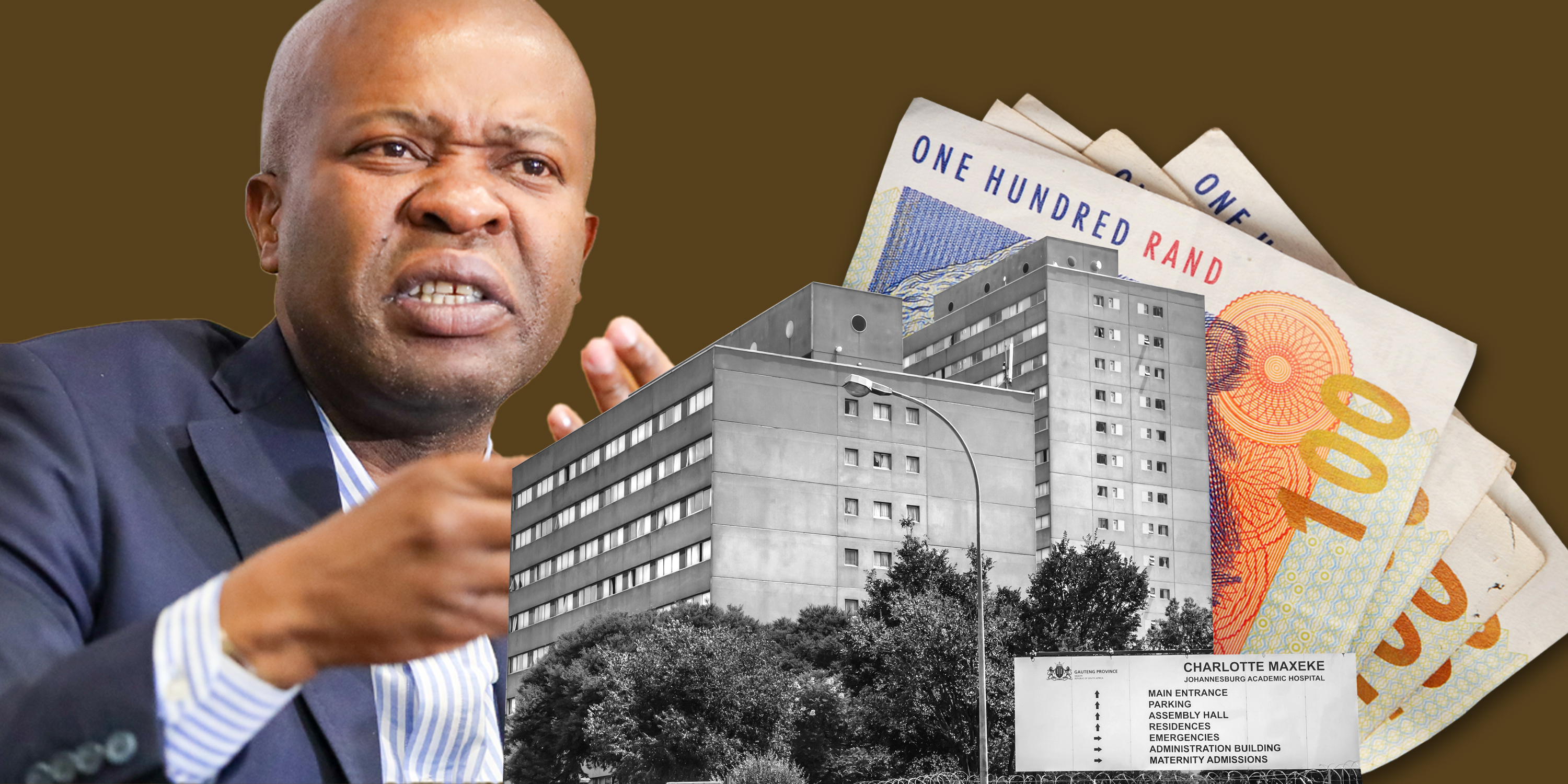While the Gauteng Health Department is the biggest beneficiary in the province’s 2025/26 financial year budget, receiving R67-billion – a 3.7% decrease from the previous year – the DA believes that this allocation is unlikely to improve the province’s healthcare crisis.
Last year, the department failed to spend R1.1-billion of its 2023/24 budget due to issues with financial controls and poor planning.
The Gauteng health system has long been in crisis. Other than previous underspending, patients endure delays in oncology treatment and the department struggles to maintain health facilities and secure goods and services.
“This is the first time I can honestly say I think Gauteng health is going to collapse,” a healthcare worker told Daily Maverick last week.
Read more: Gauteng health workers, experts raise alarm as hiring freezes pose risk to patient care
Delivering the 2025/26 budget, Maile said the R67-billion health budget was intended to strengthen the public health system, ensuring equitable, patient-centred care, particularly in underserved communities. Maile delivered the speech at the provincial legislature in darkness, with power supplied by a generator.
Some initiatives the government intends to focus on include modernising infrastructure, digitising health records, enhancing governance and building capacity to effectively combat both communicable and non-communicable diseases.
The DA’s shadow health MEC, Jack Bloom, said the department was in a severe crisis and Gauteng hospital patients would continue to suffer, with no provision to pay the R4.3-billion owed to suppliers and no money to fill staff vacancies.
The situation would be further worsened by the fact that the budget had not accounted for 1,180 vacant critical positions, nor the 7,131 professional nurses needed to provide quality healthcare, said Bloom.
In addition, no extra funds had been allocated to repair deteriorating hospitals, none of which met fire and safety standards.
Bloom said the budget had not made any provision for the withdrawal of US Pepfar funding and raised concerns over the department’s ineffective top management, which had struggled to properly allocate the existing budget.
Read more: Health and human rights groups (again) call on government to mitigate impact of Trump’s aid freeze
“I think Premier [Panyaza] Lesufi is neglecting the Gauteng Health Department. He is not treating it like a priority. He said very little about it in his [State of the Province] address, and I think for political reasons he’s not moving against the top management and the MEC who should all be removed.”
Bloom said his party would now write to the National Treasury to ask why the provincial government had failed to allocate extra health spending in line with Finance Minister Enoch Godongwana’s instruction during his national budget speech.
Russell Rensburg of the Rural health Advocacy Project criticised the province for its continued failures in recent years, citing major scandals such as the cancer care crisis, the Charlotte Maxeke fire and issues at Rahima Moosa as well as Helen Joseph Hospital.
“All of these have contributed to a significant trust deficit between the department, healthcare workers as well as the communities it serves.”
He said the department should work with stakeholders from the schools of public health, medical schools and civil society to develop a refocused provincial health services strengthening plan to be implemented over the next three years.
“This should include a review of the efficacy of provincial health management information systems, audit of the provincial hospital and district HR plans and lastly strengthening procurement systems to reduce the impact of corruption on service delivery,” Rensburg said.
Liquidation concerns
Maile also warned that the province could face liquidity issues if resources were not spent prudently across the various departments, which must align spending with the 2024-2029 Medium-Term Development Plan.
“Failure to act decisively — through expenditure oversight, keeping the overall wage bill under control and exploring alternative funding models — will risk deepening the liquidity crisis, threatening service delivery, and exposing the province to significant governance and fiscal risks,” Maile said.
Although liquidation is uncommon in South Africa, if it were to happen, the national government would intervene. Under Section 100 of the Constitution, the national government has the power to step in when a province fails to meet its responsibilities, particularly in cases of serious financial or governance issues.
 A number of departments experienced budget cuts in Gauteng's latest budget, released on 18 March 2025. Graphic by Jocelyn Adamson
A number of departments experienced budget cuts in Gauteng's latest budget, released on 18 March 2025. Graphic by Jocelyn Adamson
Gauteng is grappling with several recurring problems including governance failures, financial mismanagement, crumbling infrastructure, crime and lawlessness and lack of service delivery.
Maile acknowledged the province’s challenges, suggesting times were tough.
“There must be no doubt, even in the face of challenges that we face, that Gauteng is still the nerve-centre of the regional economy. The challenges that we are confronted with are not insurmountable.”
For years, there have been concerns about the increasing public wage bill, particularly due to the significant pressure it places on the provincial budget.
Maile seems not to have a clear strategy for reducing it as it has surged by billions in recent years. In his speech, he acknowledged that the wage bill accounted for the largest share of government spending and said his goal was to keep it below 60% of total expenditure.
Asked how he intended to achieve this, Maile said his administration would not allow departments to hire “unless [it] is necessary, relevant and [to] impactful positions”.
The wage bill has been steadily increasing in recent years. It jumped from R83-billion in 2020/21, to R100-billion in 2024/25 and is expected to increase to R105-billion in 2025/26, R110-billion in 2026/27 and R116-billion in 2027/28.
DA provincial leader Solly Msimanga said the administration could not talk about reducing the wage bill while Lesufi continued to announce the hiring of crime wardens and teacher assistants – positions that the relevant departments had repeatedly said were not included in their organisational structures and were not affordable. DM





